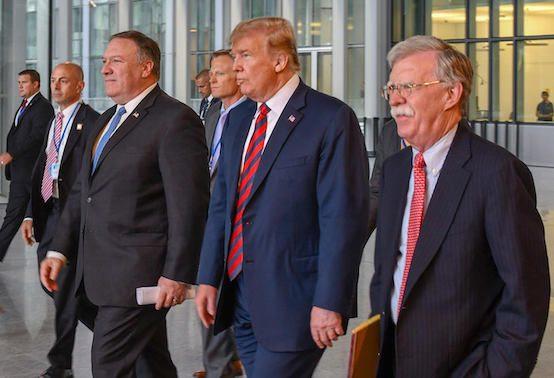 He’s the closest thing we’ve had to an antiwar president in 40 years - but the entrenched interests have proven too strong...
He’s the closest thing we’ve had to an antiwar president in 40 years - but the entrenched interests have proven too strong...Authored by Andrew Bacevich: From my distant vantage point in New England, tracking the daily fluctuations of the ongoing Iran war scare poses a challenge. It’s that old problem of distinguishing between signals and noise. These days there is noise aplenty emanating from Washington. That the prospect of yet another Gulf war competes for bandwidth with intensifying efforts to impeach President Trump makes it more difficult still to know what exactly is going on.
My bet is that an actual shooting war involving the United States and the Islamic Republic will not occur. Granted, we cannot exclude the possibility of inadvertent hostilities caused by one side misreading the intentions or actions of the other side. Nor should we ignore the possibility of bellicose subordinates exceeding their briefs and stumbling into a fight that authorities at the top may not have authorized. Posturing invites misunderstanding and miscalculation—and there has been more than a little posturing coming from both Washington and Tehran.
Yet even if armed conflict is averted, the Iran War Scare of 2019 will deserve recognition as a moment of genuine strategic significance. With the current dustup involving Iran, the likelihood of President Trump ending the “forever wars” is now gone for good.
Only rarely have I agreed with Trump on anything. His frequent and apparently sincere denunciations of our various wars in the Greater Middle East stand as the principal exception to that statement. As both candidate and president, Trump has repeatedly made clear his intention to extricate the United States from the vast military quagmire that his several predecessors, both Republicans and Democrats, have created in that region.
Consistency has not been a strong suit of Trump’s administration. Yet terminating our interminable wars while lowering the US military profile in the Islamic world does seem to be something to which the president is actually committed.
Yet the national security apparatus and members of his own administration have opposed him every step of the way. Trump wanted US troops out of Afghanistan. They are still there. He wanted US troops out of Syria. They are still there. So, too, are 5,000 more in neighboring Iraq—more than 16 years after the overthrow of Saddam Hussein.
The nominal rationale for the US military presence and combat actions in the Greater Middle East changes with dizzying frequency. It once had something to do with overthrowing dictators, spreading democracy, and promoting human rights.Then, for a time, the mission was to eliminate terrorism. Somewhere along the line, it changed to promoting stability. Now, the focus has shifted to Iran, assigned a place in the pecking order of official US adversaries that once belonged to Saddam, then to al-Qaeda, and then to ISIS.
We don’t have a strategy in the Greater Middle East. We merely have a variable roster of enemies.
In reality, if US military policies in the Islamic world actually retain an overarching purpose, it is simply to persist and do so without thinking too deeply about costs and consequences.Elevating Iran to the status of existential threat is ideal for these purposes.
This is where the drumbeat of a possible showdown with the ayatollahs has played such an important role. Recall the tenor of the discussion in recent days about the possible direction of US policy. First, there was the leaked Pentagon report of a war plan—100,000 troops earmarked for commitment. Then there was the leaked “defensive” deployment of 10,000 troops to protect US forces already there.
It’s not the numbers here that matter, but the unspoken (and largely unchallenged) assumption that the problems facing the United States in the Greater Middle East are military problems that will require further military action on top of the various and sundry actions undertaken over the past couple of decades. And so now we have the New York Times revealing that “President Trump has decided to deploy about 1,500 additional American troops to the Middle East to provide protection for American service members already there.”
Again, the precise numbers are almost beside the point. In effect, Trump has drawn his own line in the sand, one that says: “We ain’t leaving, no sir.” His decision—was it really his?—is in effect a capitulation. Trump has deferred to the institutions, interests, and individuals intent on perpetuating the forever wars. Devious and diabolical and brilliant, the war party, abetted by its foreign auxiliaries, has prevailed. Trump will now surely bequeath those wars to his successor—that’s the significance of the Iran war scare.
Trump is closest thing we have had to an antiwar president since Jimmy Carter and perhaps since Herbert Hoover. But today, no president, even one who recognizes the folly of our foreign policy misadventures, is a match for the war machine.
Democrats looking for evidence of conspiracy and collusion ought to turn their attention there.
Source
No comments:
Post a Comment